Mofetoluwa Adeyemi
BLAB: Brutally Long Audio Bench
May 05, 2025Abstract:Developing large audio language models (LMs) capable of understanding diverse spoken interactions is essential for accommodating the multimodal nature of human communication and can increase the accessibility of language technologies across different user populations. Recent work on audio LMs has primarily evaluated their performance on short audio segments, typically under 30 seconds, with limited exploration of long-form conversational speech segments that more closely reflect natural user interactions with these models. We introduce Brutally Long Audio Bench (BLAB), a challenging long-form audio benchmark that evaluates audio LMs on localization, duration estimation, emotion, and counting tasks using audio segments averaging 51 minutes in length. BLAB consists of 833+ hours of diverse, full-length audio clips, each paired with human-annotated, text-based natural language questions and answers. Our audio data were collected from permissively licensed sources and underwent a human-assisted filtering process to ensure task compliance. We evaluate six open-source and proprietary audio LMs on BLAB and find that all of them, including advanced models such as Gemini 2.0 Pro and GPT-4o, struggle with the tasks in BLAB. Our comprehensive analysis reveals key insights into the trade-offs between task difficulty and audio duration. In general, we find that audio LMs struggle with long-form speech, with performance declining as duration increases. They perform poorly on localization, temporal reasoning, counting, and struggle to understand non-phonemic information, relying more on prompts than audio content. BLAB serves as a challenging evaluation framework to develop audio LMs with robust long-form audio understanding capabilities.
Zero-Shot Cross-Lingual Reranking with Large Language Models for Low-Resource Languages
Dec 26, 2023Abstract:Large language models (LLMs) have shown impressive zero-shot capabilities in various document reranking tasks. Despite their successful implementations, there is still a gap in existing literature on their effectiveness in low-resource languages. To address this gap, we investigate how LLMs function as rerankers in cross-lingual information retrieval (CLIR) systems for African languages. Our implementation covers English and four African languages (Hausa, Somali, Swahili, and Yoruba) and we examine cross-lingual reranking with queries in English and passages in the African languages. Additionally, we analyze and compare the effectiveness of monolingual reranking using both query and document translations. We also evaluate the effectiveness of LLMs when leveraging their own generated translations. To get a grasp of the effectiveness of multiple LLMs, our study focuses on the proprietary models RankGPT-4 and RankGPT-3.5, along with the open-source model, RankZephyr. While reranking remains most effective in English, our results reveal that cross-lingual reranking may be competitive with reranking in African languages depending on the multilingual capability of the LLM.
AfriQA: Cross-lingual Open-Retrieval Question Answering for African Languages
May 11, 2023



Abstract:African languages have far less in-language content available digitally, making it challenging for question answering systems to satisfy the information needs of users. Cross-lingual open-retrieval question answering (XOR QA) systems -- those that retrieve answer content from other languages while serving people in their native language -- offer a means of filling this gap. To this end, we create AfriQA, the first cross-lingual QA dataset with a focus on African languages. AfriQA includes 12,000+ XOR QA examples across 10 African languages. While previous datasets have focused primarily on languages where cross-lingual QA augments coverage from the target language, AfriQA focuses on languages where cross-lingual answer content is the only high-coverage source of answer content. Because of this, we argue that African languages are one of the most important and realistic use cases for XOR QA. Our experiments demonstrate the poor performance of automatic translation and multilingual retrieval methods. Overall, AfriQA proves challenging for state-of-the-art QA models. We hope that the dataset enables the development of more equitable QA technology.
Separating Grains from the Chaff: Using Data Filtering to Improve Multilingual Translation for Low-Resourced African Languages
Oct 20, 2022
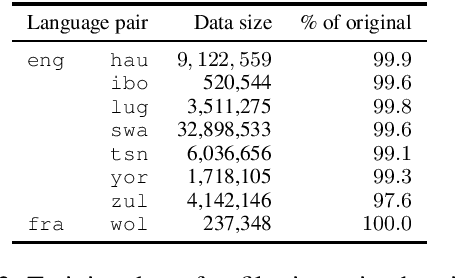


Abstract:We participated in the WMT 2022 Large-Scale Machine Translation Evaluation for the African Languages Shared Task. This work describes our approach, which is based on filtering the given noisy data using a sentence-pair classifier that was built by fine-tuning a pre-trained language model. To train the classifier, we obtain positive samples (i.e. high-quality parallel sentences) from a gold-standard curated dataset and extract negative samples (i.e. low-quality parallel sentences) from automatically aligned parallel data by choosing sentences with low alignment scores. Our final machine translation model was then trained on filtered data, instead of the entire noisy dataset. We empirically validate our approach by evaluating on two common datasets and show that data filtering generally improves overall translation quality, in some cases even significantly.
Ìtàkúròso: Exploiting Cross-Lingual Transferability for Natural Language Generation of Dialogues in Low-Resource, African Languages
Apr 17, 2022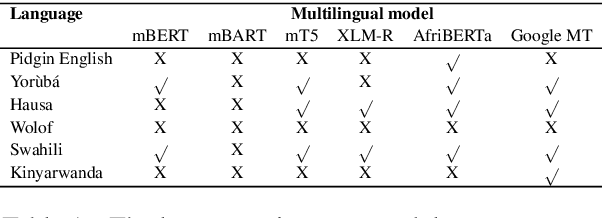
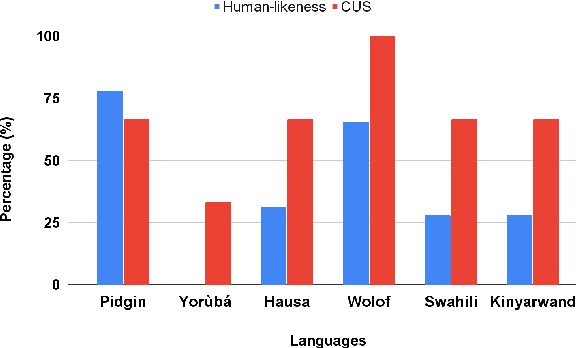
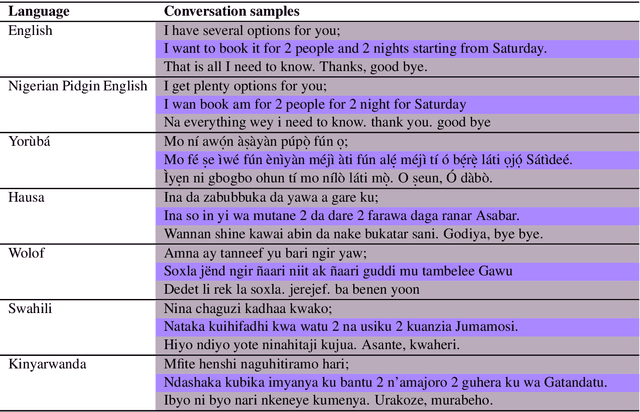
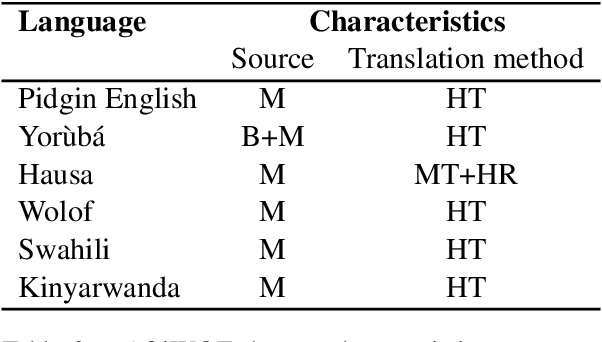
Abstract:We investigate the possibility of cross-lingual transfer from a state-of-the-art (SoTA) deep monolingual model (DialoGPT) to 6 African languages and compare with 2 baselines (BlenderBot 90M, another SoTA, and a simple Seq2Seq). The languages are Swahili, Wolof, Hausa, Nigerian Pidgin English, Kinyarwanda & Yor\`ub\'a. Generation of dialogues is known to be a challenging task for many reasons. It becomes more challenging for African languages which are low-resource in terms of data. Therefore, we translate a small portion of the English multi-domain MultiWOZ dataset for each target language. Besides intrinsic evaluation (i.e. perplexity), we conduct human evaluation of single-turn conversations by using majority votes and measure inter-annotator agreement (IAA). The results show that the hypothesis that deep monolingual models learn some abstractions that generalise across languages holds. We observe human-like conversations in 5 out of the 6 languages. It, however, applies to different degrees in different languages, which is expected. The language with the most transferable properties is the Nigerian Pidgin English, with a human-likeness score of 78.1%, of which 34.4% are unanimous. The main contributions of this paper include the representation (through the provision of high-quality dialogue data) of under-represented African languages and demonstrating the cross-lingual transferability hypothesis for dialogue systems. We also provide the datasets and host the model checkpoints/demos on the HuggingFace hub for public access.
Quality at a Glance: An Audit of Web-Crawled Multilingual Datasets
Mar 22, 2021
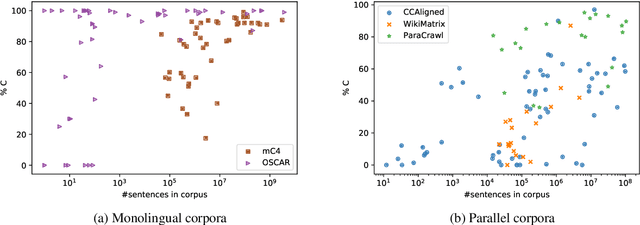
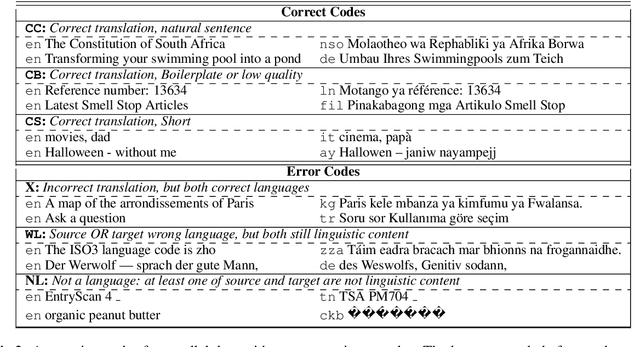
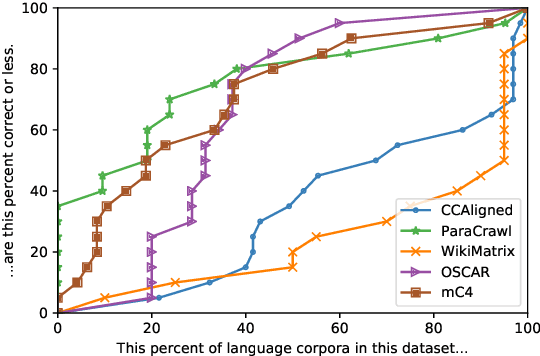
Abstract:With the success of large-scale pre-training and multilingual modeling in Natural Language Processing (NLP), recent years have seen a proliferation of large, web-mined text datasets covering hundreds of languages. However, to date there has been no systematic analysis of the quality of these publicly available datasets, or whether the datasets actually contain content in the languages they claim to represent. In this work, we manually audit the quality of 205 language-specific corpora released with five major public datasets (CCAligned, ParaCrawl, WikiMatrix, OSCAR, mC4), and audit the correctness of language codes in a sixth (JW300). We find that lower-resource corpora have systematic issues: at least 15 corpora are completely erroneous, and a significant fraction contains less than 50% sentences of acceptable quality. Similarly, we find 82 corpora that are mislabeled or use nonstandard/ambiguous language codes. We demonstrate that these issues are easy to detect even for non-speakers of the languages in question, and supplement the human judgements with automatic analyses. Inspired by our analysis, we recommend techniques to evaluate and improve multilingual corpora and discuss the risks that come with low-quality data releases.
MasakhaNER: Named Entity Recognition for African Languages
Mar 22, 2021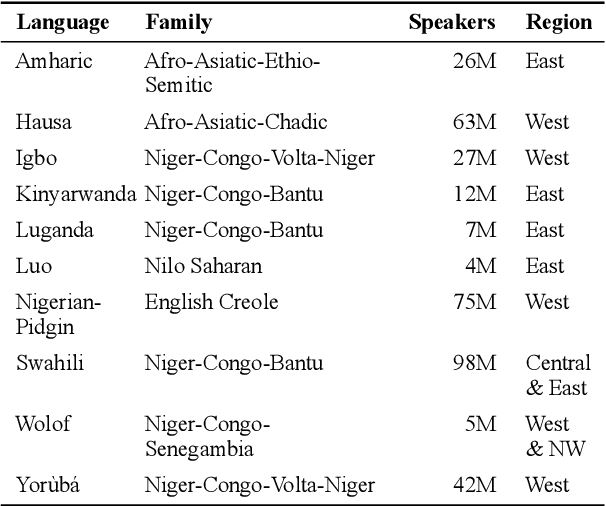
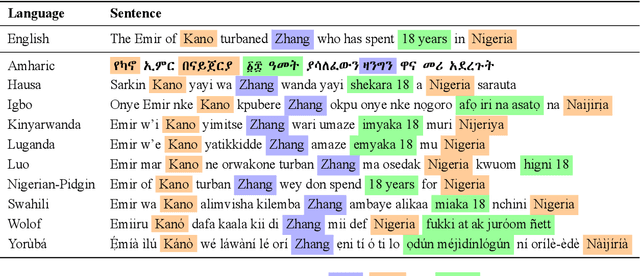

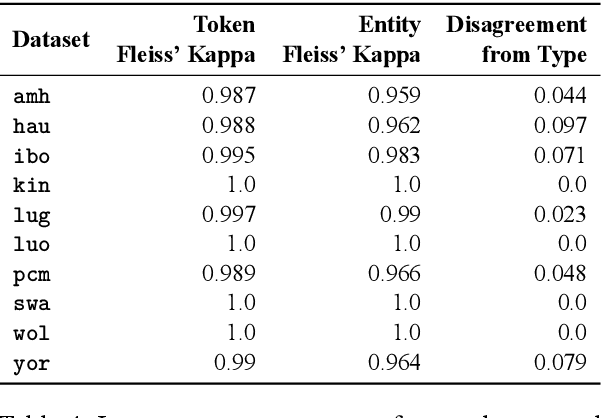
Abstract:We take a step towards addressing the under-representation of the African continent in NLP research by creating the first large publicly available high-quality dataset for named entity recognition (NER) in ten African languages, bringing together a variety of stakeholders. We detail characteristics of the languages to help researchers understand the challenges that these languages pose for NER. We analyze our datasets and conduct an extensive empirical evaluation of state-of-the-art methods across both supervised and transfer learning settings. We release the data, code, and models in order to inspire future research on African NLP.
 Add to Chrome
Add to Chrome Add to Firefox
Add to Firefox Add to Edge
Add to Edge